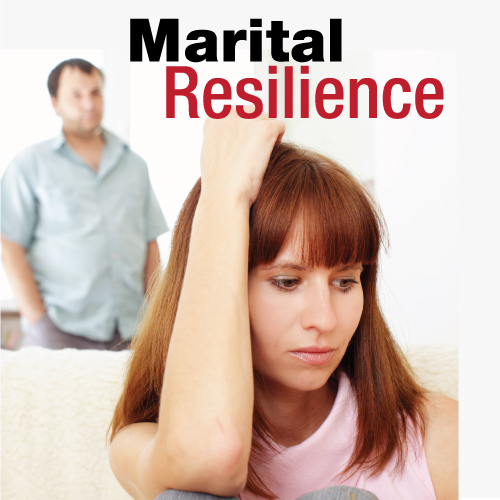Marital Resilience

Let’s face it – marriage is a tough gig these days. With divorce rates higher than we’d like, too many families are being torn apart by marriage breakdown. What can couples do to immunize their marriages against this tragedy?
Marital resilience starts with a well-grounded understanding of what marriage is and what it isn’t. A lot of couples get themselves into trouble because they expect marriage, that is their spouse, to make them happy. So when they are not happy, they project their unhappiness onto their spouse, stressing the relationship.
Research demonstrates that happiness is internally driven. Rich people aren’t happier overall than poor people for example.If you expect your spouse to make you happy, you’ll be disappointed and you’ll put an unhealthy burden on your marriage. So here’s the big insight:
Marriage isn’t meant to make you happy, it’s meant to make you holy.
In other words, marriage is a pathway to holiness. It’s a mechanism for personal and spiritual growth. This means that at times it’s going to stretch our tolerance and test our patience.
And this is a good thing! This is how we grow.
Marriages break down because one or both spouses are blocked to growth and change. They break down because one or both refuses to recognise that they are responsible for their own happiness.
Of course, marriage isn’t meant to make us miserable either. When we handle these growth opportunities badly, we can inflict unnecessary pain on each other.
The most resilient marriages are those in which the spouses have learnt strategies to manage these growth times productively. Conflict resolution and advanced communication methods are the bread and butter of marriage education courses and have been demonstrated to have a substantial impact. Marital Resilience is an essential life-skill that protects your relationship from breakdown.
Stop-Reflect-Connect
Manage your arguments more effectively by following these three steps.
- Stop | When things get heated, stop! Call a time out. Self-soothe with exercise, deep breathing, relaxation exercises, prayer, a cup of tea – whatever works for you.
- Reflect | When you are calm, think about what you REALLY want. Don’t just give a superficial answer, what is the value, your ultimate, long-term goal that is driving you in this argument? Example: In an argument about money – go beyond just wanting (or not wanting) a particular item, such as a new TV, and articulate the deeper values of couple connection, recreation/peace, financial security, social status etc. Avoid using this time to rehearse your argument.
- Connect | Come back together within 24 hours but not less than half an hour. Spend a few minutes reconnecting with a kiss, a long hug, holding hands and making eye contact – whatever works for you. Remember the most important value is your love and unity. Then share your answers before brainstorming ways to honour both your values.
Quiz: How well do you manage conflict?
Research by John Gottman et al identifies these seven deadly habits as particularly damaging. Give yourself a rating: (0 = never, 1 = sometimes, 2 = often).
In an argument I am likely to use…
- Harsh start up (eg. “We need to talk, now!” vs soft start up, “Honey, can we make some time to talk something through?”)
- Criticism (eg. “you shouldn’t do that” vs complaint, “I feel really upset when you do that”)
- Contempt (eg. sneering, name calling, assigning negative motive, criticising with a superior or patronising tone… “you’re such a loser!”)
- Defensiveness (refusing to take any responsibility, deflecting blame to someone or something else)
- Globalisation (“you ALWAYS”, or “you NEVER” statements)
- Stonewalling (refusing to talk or engage, walking out, ignoring spouse)
- Rejecting repair attempts (ignoring or rejecting attempts by a spouse to break the pattern of the argument)
Your Score:
0- 3 | Awesome! You’re well on the way to building a resilent marriage.
4-9 | Not bad – you’ve got a solid foundation but there’s still plenty of room for improvement.
10-14 | Yikes! You need some serious changes in the way you relate – don’t delay! Go book now for a marriage education class.





Excellent article and quiz! Thank you!
Excellent article and quiz! Thank you!